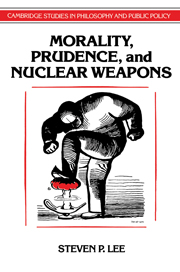Preface and acknowledgments
Published online by Cambridge University Press: 06 July 2010
Summary
Nuclear weapons have created the permanent possibility of a unique and peculiar military relationship, often referred to as the state of mutual assured destruction or mutual vulnerability. This is the form that deterrence with nuclear weapons has taken. Its coming into being was largely an unintended consequence of actions taken by individual nations in an attempt to promote their national security, and its defense has had the character of an effort to make a virtue out of necessity. I seek to examine this defense, in both its prudential and moral dimensions. Given our notions of military prudence and morality, nuclear weapons, because of their immense and terrible destructive capability, pose a challenge to the coherence of our normative understanding. I attempt to explain this challenge and to move toward a solution to the problems it raises.
The prudential and moral debates over nuclear weapons have taken place largely independently of each other. On the prudential side, nuclear strategists have argued over which form of nuclear deterrence best promotes national security, with little or no reference to the question of whether nuclear threats are morally justifiable. On the moral side, those engaged in the debate over the moral justifiability of nuclear deterrence have given little attention to strategic matters and the consequences of different strategic options. The one-sided character of the debates has made them partial and incomplete, for the prudential and moral issues are intimately related. A proper understanding of the problems nuclear weapons pose must be based on an appreciation of their normative implications taken together, not their prudential or their moral implications treated separately.
- Type
- Chapter
- Information
- Morality, Prudence, and Nuclear Weapons , pp. ix - xivPublisher: Cambridge University PressPrint publication year: 1993

